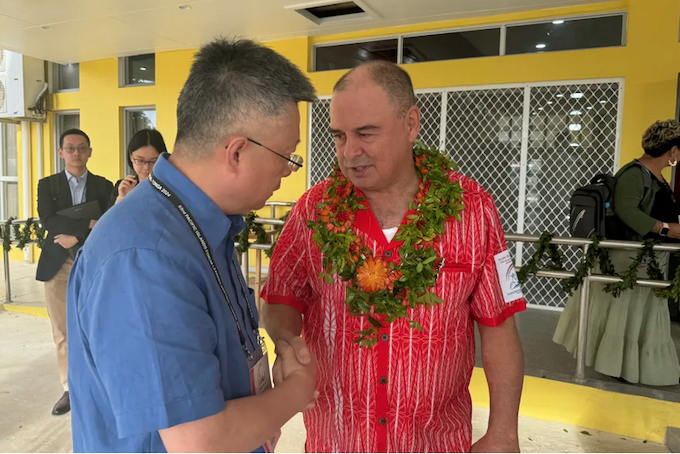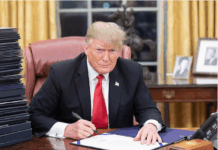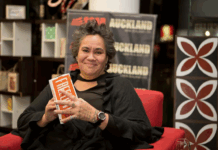
By Caleb Fotheringham, RNZ Pacific journalist
China and the Cook Islands’ relationship “should not be disrupted or restrained by any third party”, says Chinese Foreign Ministry spokesperson Guo Jiakun, as opposition leaders in Rarotonga express a loss of confidence in Prime Minister Mark Brown.
In response to questions from the Associated Press about New Zealand government’s concerns regarding Brown’s visit to Beijing this week, Guo said Cook Islands was an important partner of China in the South Pacific.
“Since establishing diplomatic relations in 1997, our two countries have respected each other, treated each other as equals, and sought common development, achieving fruitful outcomes in exchanges and cooperation in various areas,” he said.
- READ MORE: Cook Islands crisis: Haka with the taniwha or dance with the dragon?
- Explainer: The diplomatic row between New Zealand and the Cook Islands
- Cook Islands’ diplomatic snub to NZ will be noticed – commentator
- Mark Brown on China deal: ‘No need for NZ to sit in the room with us’
- No debt in China deal – Mark Brown
- Mediawatch: NZ media in the middle of Asia-Pacific diplomatic drama
- Other China in Pacific reports
“China stands ready to work with the Cook Islands for new progress in bilateral relations.”
Guo said China viewed both New Zealand and the Cook Islands as important cooperation partners.
“China stands ready to grow ties and carry out cooperation with Pacific Island countries, including the Cook Islands,” he said.
“The relationship between China and the Cook Islands does not target any third party, and should not be disrupted or restrained by any third party.”
Information ‘in due course’
Guo added that Beijing would release information about the visit and the comprehensive strategic partnership agreement “in due course”.

However, Cook Islanders, as well as the New Zealand government, have been left frustrated with the lack of clarity over what is in the deal which is expected to be penned this week.
United Party leader Teariki Heather is planning a protest on February 17 against Brown’s leadership.
He previously told RNZ that it seemed like Brown was “dictating to the people of the Cook Islands, that I’m the leader of this country and I do whatever I like”.
Another opposition MP with the Democratic Party, Tina Browne, is planning to attend the protest.
She said Brown “doesn’t understand the word transparent”.
“He is saying once we sign up we’ll provide copies [of the deal],” Browne said.
“Well, what’s the point? The agreement has been signed by the government so what’s the point in providing copies.
“If there is anything in the agreement that people do not agree with, what do we do then?”
Repeated attempts by Peters
New Zealand’s Foreign Affairs office said Winston Peters had made repeated attempts for the government of the Cook Islands to share the details of the proposed agreement, which they had not done.
Peters’ spokesperson, like Browne, said consultation was only meaningful if it happened before an agreement was reached, not after.
“We therefore view the Cook Islands as having failed to properly consult New Zealand with respect to any agreements it plans to sign this coming week in China,” the spokesperson said.
Prime Minister Brown told RNZ Pacific that he did not think New Zealand needed to see the level of detail they are after, despite being a constitutional partner.
Ocean Ancestors, an ocean advocacy group, said Brown’s decision had taken people by surprise, despite the Cook Islands having had a long-term relationship with the Asia superpower.
“We are in the dark about what could be signed and so for us our concerns are that we are committing ourselves to something that could be very long term and it’s an agreement that we haven’t had consensus over,” the organisation’s spokesperson Louisa Castledine said.
The details that Brown has shared are that he would be seeking areas of cooperation, including help with a new inter-island vessel to replace the existing ageing ship and for controversial deep-sea mining research.
Castledine hopes that no promises have been made to China regarding seabed minerals.
“As far as we are concerned, we have not completed our research phase and we are still yet to make an informed decision about how we progress [on deep-sea mining],” she said.
“I would like to think that deep-sea mining is not a point of discussion, even though I am not delusional to the idea that it would be very attractive to any agreement.”
This article is republished under a community partnership agreement with RNZ.












































